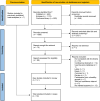The impact of social relationships on the risk of stroke and post-stroke mortality: a systematic review and meta-analysis
- PMID: 39232685
- PMCID: PMC11373457
- DOI: 10.1186/s12889-024-19835-6
The impact of social relationships on the risk of stroke and post-stroke mortality: a systematic review and meta-analysis
Abstract
Background: The association between poor social relationships and post-stroke mortality remains uncertain, and the evidence regarding the relationship between poor social relationships and the risk of stroke is inconsistent. In this meta-analysis, we aim to elucidate the evidence concerning the risk of stroke and post-stroke mortality among individuals experiencing a poor social relationships, including social isolation, limited social networks, lack of social support, and loneliness.
Methods: A thorough search of PubMed, Embase, and the Cochrane Library databases to systematically identify pertinent studies. Data extraction was independently performed by two researchers. Pooled odds ratios (ORs) with 95% confidence intervals (CIs) were calculated using either a random-effects or fixed-effects model. Sensitivity analyses were conducted to evaluate the reliability of the results. Random-effects meta-regression was performed to explore the sources of heterogeneity in stroke risk estimates between studies. Assessment for potential publication bias was carried out using Egger's and Begg's tests.
Results: Nineteen studies were included, originating from 4 continents and 12 countries worldwide. A total of 1,675,707 participants contributed to this meta-analysis. Pooled analyses under the random effect model revealed a significant association between poor social relationships and the risk of stroke (OR = 1.30; 95%CI: 1.17-1.44), as well as increased risks for post-stroke mortality (OR = 1.36; 95%CI: 1.07-1.73). Subgroup analyses demonstrated associations between limited social network (OR = 1.52; 95%CI = 1.04-2.21), loneliness (OR = 1.31; 95%CI = 1.13-1.51), and lack of social support (OR = 1.66; 95%CI = 1.04-2.63) with stroke risk. The meta-regression explained 75.21% of the differences in reported stroke risk between studies. Random-effect meta-regression results indicate that the heterogeneity in the estimated risk of stroke may originate from the continent and publication year of the included studies.
Conclusion: Social isolation, limited social networks, lack of social support, and feelings of loneliness have emerged as distinct risk factors contributing to both the onset and subsequent mortality following a stroke. It is imperative for public health policies to prioritize the multifaceted influence of social relationships and loneliness in stroke prevention and post-stroke care.
Trial registration: The protocol was registered on May 1, 2024, on the Prospero International Prospective System with registration number CRD42024531036.
Keywords: Meta-analysis; Mortality; Social isolation; Social network; Social support; Stroke.
© 2024. The Author(s).
Conflict of interest statement
The authors declare no competing interests.
Figures





Similar articles
-
Folic acid supplementation and malaria susceptibility and severity among people taking antifolate antimalarial drugs in endemic areas.Cochrane Database Syst Rev. 2022 Feb 1;2(2022):CD014217. doi: 10.1002/14651858.CD014217. Cochrane Database Syst Rev. 2022. PMID: 36321557 Free PMC article.
-
Deployment of personnel to military operations: impact on mental health and social functioning.Campbell Syst Rev. 2018 Jun 1;14(1):1-127. doi: 10.4073/csr.2018.6. eCollection 2018. Campbell Syst Rev. 2018. PMID: 37131363 Free PMC article.
-
The effect of exposure to long working hours on stroke: A systematic review and meta-analysis from the WHO/ILO Joint Estimates of the Work-related Burden of Disease and Injury.Environ Int. 2020 Sep;142:105746. doi: 10.1016/j.envint.2020.105746. Epub 2020 Jun 3. Environ Int. 2020. PMID: 32505015
-
Loneliness and social isolation as risk factors for coronary heart disease and stroke: systematic review and meta-analysis of longitudinal observational studies.Heart. 2016 Jul 1;102(13):1009-16. doi: 10.1136/heartjnl-2015-308790. Epub 2016 Apr 18. Heart. 2016. PMID: 27091846 Free PMC article. Review.
-
Loneliness and social isolation among informal carers of individuals with dementia: A systematic review and meta-analysis.Int J Geriatr Psychiatry. 2024 May;39(5):e6101. doi: 10.1002/gps.6101. Int J Geriatr Psychiatry. 2024. PMID: 38752797 Review.
References
Publication types
MeSH terms
LinkOut - more resources
Full Text Sources
Medical

